The App Store – Which Mobile OS Has the Best App Store ?
5 years ago, only the technically minded had heard the term ‘app’. Today, The App Store is a critically important part of the ‘ecosystem’ surrounding the mobile OS or ‘Operating System’ in the phone you buy.
For Google’s Android Platform, Microsoft’s revitalized Windows 8 Handheld Operating System and Apple’s iOS equivalent, apps are big business. These companies take 20% – 30% of revenues from every app sold. With more than 30 billion apps downloaded to date, across all 3 platforms, that’s big bikkies.
To users like you and me, apps make a huge difference to the experience we have of the phone we buy, how much we like it and use it. App is short for application. Apps are software that performs a specific task for you. Whether you need to check in at an airport as quickly as possible, find a torch right now or back up some pictures you took on your phone to some cloud storage, these days, ‘there’s an app for that.’ Most are designed for the current range of ( smart ) mobile phones. You’ll be able to operate them with your finger, tapping and swiping as you do to use the features of the Operating System you choose.
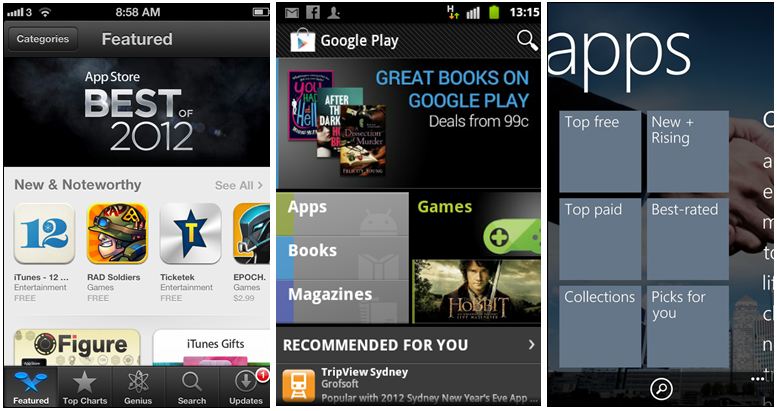
Android, Apple’s iOS and Windows Mobile Operating Systems all provide access to their own App Stores
Apps are easy to get, easy to use, cheap and, most important of all, they solve a problem you need solved. The sum of all these satisfied user needs is, of course, the reason people buy the phones they do.
If you’re deciding whether Android, Apple or Windows is the right ( smart ) mobile phone for you, it’s more than likely you’re interested in comparing their app stores. We do that below, in this article. Read on and you’ll find :
- Number of apps in each store & and why you probably shouldn’t worry about it
- What apps are & how to get them for an iPhone, an Galaxy S3 or an HTC 8X
- The pros and cons of each of the main app stores & and what they mean to you
App Store Numbers – Try Not To Focus On Them
Nielsen ( a US research firm ) say that the average user has 40 – 50 apps installed on their phone. Whichever App Store you choose, you’ll have tens of thousands of apps on offer to you. Many of them are low quality and or not very useful.
What matters, when it comes to apps is not whether they have every app but whether the store you’re shopping in has the apps you need and how easy they are to find.
Using your App Store
Whether you choose Android, Windows Phone 8 or Apple’s iOS, your device will come with a pre-installed icon which takes you to the App Store.
- Windows Phone 8’s App Store is called the Windows Phone Market Place.
- Android’s App Store is called Google Play.
- Apple’s App Store is iTunes.
Again, in any of the stores, you’ll be able to browse if you don’t know what you’re looking for, meandering around categories like ‘free’ or ‘games’ until you find something you like. All the stores have user reviews with star ratings so you know if you can expect something good or not so good.
Many apps are free, some are charged for. Most which cost money charged $0.99 and $2.99. Most likely, you’ll be charged against a credit card which you have set up in the App Store yourself.
If you don’t know, apps are not interchangeable. If you buy Angry Birds for an Android device, you’ll have to buy it again if you want to play it on another platform.
iPhone App Store
Most people have at last some experience shopping in iTunes for music.
Apple were the first to realise the importance of The App Store and popularized it, as they have a knack for doing. Apple turned what was, just a few years ago, seen as a technical activity in to a day to day procedure.
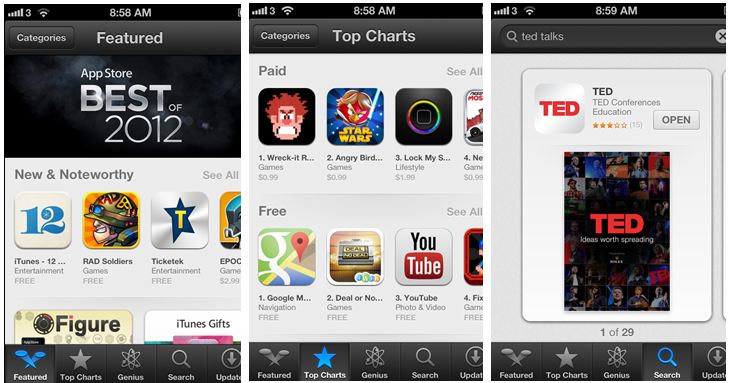
Browsing the Apple Store quickly reveals a huge range of high quality apps.
Apple suggest Apps which might suit you, as you browse.
Pros of the iPhone App Store
- Huge range of apps. Estimates in 2013 put the number of apps in the iPhone App Store at more than 700,000 and it’s always growing.
- Quality. Apple check every application they release. When you download an app from the iPhone App Store, does exactly what it said it would, looks how you’d expect it to and doesn’t cause problems anywhere else on your phone.
- Get them first. Most developers ( they’re the ones that make the apps ) build iPhone apps first. The significant user base and more standardized device range makes it easier to make more money developing for the iOS ( Apple software ) platform.
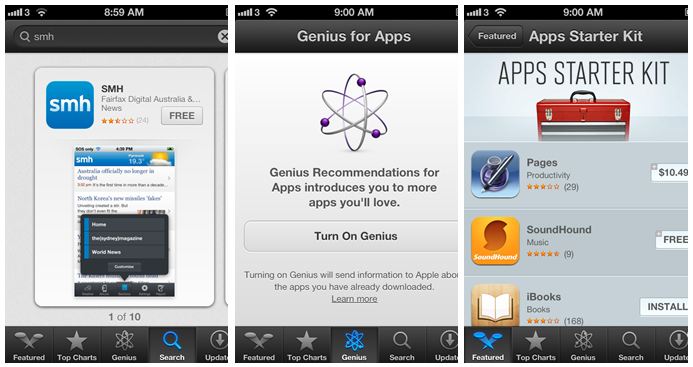
Downloading is as easy as tapping ‘Install’.
Apple’s ‘Genius’ software will help you find more to install.
Cons of the iPhone App Store
- Critics say that Apple’s ‘quality checking’ stifles innovation. Apps which might push ( or exceed ) the boundaries that Apple lay down for developer submission are simply turned down. You won’t find alternative keyboards in the app store, for example. You’re only ‘allowed’ to use the Apple version. Android has no such constraints.
Android App Store
Google came to the game after Apple and, initially, added apps at a slower rate. However, over the last couple of years, they out accelerated Apple and going in to 2013, have just as many, if not slightly more apps than Apple in their store.
Pros of the Android App Store
- Huge range of apps. Estimates at the start of 2013 suggest that Google Play ( the Android App Store ) has more than 700,000 apps. Developers are adding around 25,000 apps per month.
- Innovation. Apps available from the Google store aren’t tested by anyone. This free developers up to try new things. Apps on Android allow users to configure any component of the device, just the way they like. Homepages, keyboards and cameras can all be configured in exactly the way the user wants.
- Widgets. Widgets are unique to the Android platform. They expose information without users having to open or log in to an app. Once you’re tried them, it’s hard to go back.
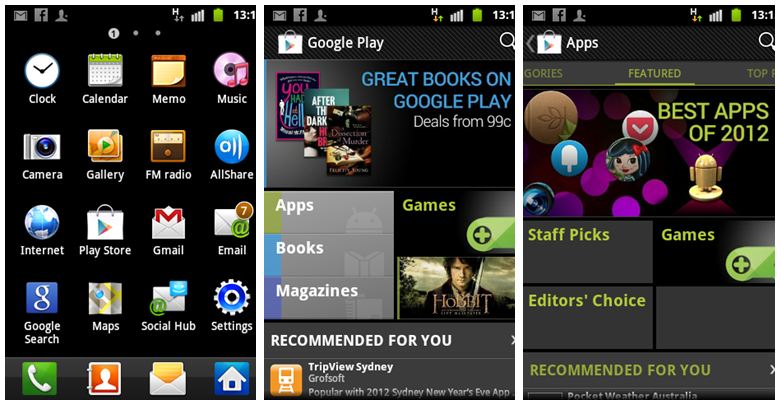
Google Play – The Android App Store is an Icon on a Home screen when you get your device.
Conceptually, Google Play is similar to iTunes – it offers Books and Films as well as apps.
Google Play also recommends apps which might be appropriate as you browse.
Cons of the Android App Store
- Rarely, they don’t work. The fact they’re not tested by anyone means that sometimes, the apps you download don’t work. In exceptionally rare circumstances, they might even do something nasty . Of of course, those that do are quickly removed from the store as a result of user complaints. Stick to brands you know and watch the user reviews to make sure it’s got a few stars from a reasonable number of people and you should be fine.
- Variety and range of phones means it’s hard to test apps on every possible combination. This can make the apps unreliable. The range of Android devices available is one of the platform’s key selling points of Google’s Android platform. Having so many screen sizes and Android Operating System versions in market presents a challenge for application developers, however, who don’t always have time to thoroughly test every app on every device.
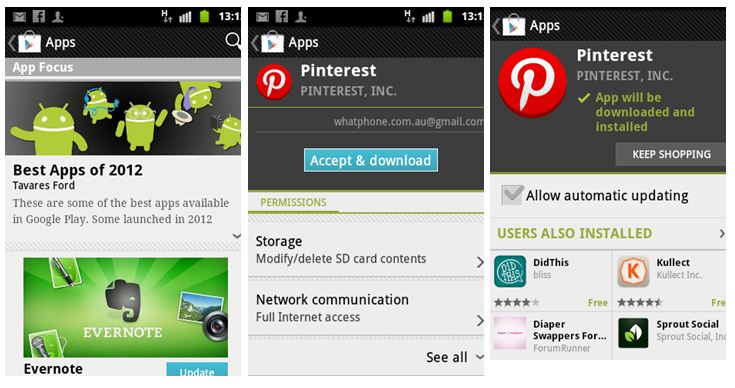
Choosing and installing an app is as simple in Google Play as iTunes ( The Apple App Store )
Just select the app you want, accept the terms and hit install.
Windows Phone App Store
Microsoft have realized how important apps are to the success of their Windows 8 platform. The app infrastructure around an Operating System either creates a ‘virtuous circle’ or it doesn’t.
Lots of users, means developers develop lots of apps which attracts lots of users, and so on. And therein lies the problem. Unfortunately, for now, in Australia, Android has over 60% smart mobile phone market share, Apple around 30% and Windows less than 5%. Windows is getting there.
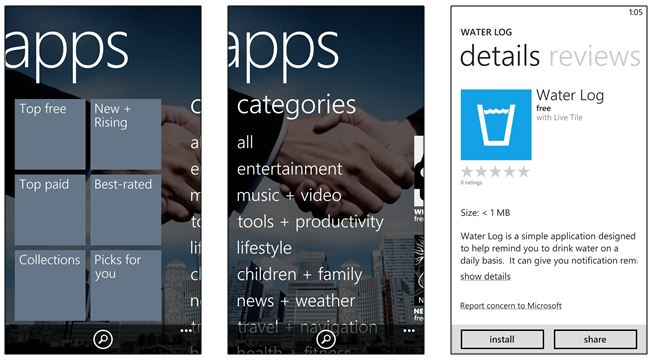
The Windows Phone App Store is less sophisticated.
The range is still high quality but offers less variety – for now.
There are signs to suggest that Microsoft is gaining momentum around it’s apps ecosystem.
Microsoft have been trying to stimulate their app market with free Windows phones for developers. They have co funding some development efforts for apps. In some cases ( Facebook and Twitter ) Microsoft has even written their own version of the app, instead of waiting for independent developers to do it.
There is some evidence to suggest that developer momentum is building around the Windows Apps Store. However, there are fewer Windows 8 apps for ( Smart ) mobile phones than are available on the other platform.
Pros of the Windows Phone App Store
- Try before you buy. Unlike the other platforms, for many apps, the Windows App Store lets you give them a go before you buy, so you know what you’re getting.
- Games. Microsoft’s Xbox brand tie in means games are unusually well represented on in the Windows Phone App Store.
- 90% are free. A higher proportion of the apps in the Windows Phone App Store are free than on the other platforms.
- Localized content. A more significant number of apps in the Windows Phone App Store are localised to languages other than English. This is largely as a result of Microsoft’s marketing in each territory around the world. It doesn’t mean much to Australian users, however.
- Microsoft Office. Don’t forget – every Windows Phone 8 device comes with Microsoft Office installed. Who doesn’t use Office products usually ?
Cons of the Windows Phone App Store
- Range of apps. Estimates differ on the number of apps in the Windows Phone App Store. Going in to 2013, it looks like there are around 150k apps. As I said at the start of this article, it’s worth thinking not about the number of apps in the store but the apps you use and whether you can find them. I have a core dozen apps which I always install on the Android and Apple devices I test and play with. Less than half of them were available in the Windows Phone App Store.
The App Store that’s right for you
Making a decision at this time, it only makes sense to consider that Android and Apple have the lead on Apps. Personally, I would weigh the pros and cons of the Apple App Store and the Google Play App Store equally. I’d say they’re both fantastic capabilities which will add real value to the ( smart ) mobile phone you buy.
Microsoft is doing all the right things to stimulate momentum in the application component of it’s ecosystem. It’s more than possible that they will win in the end. Remember, there are more than 600 million Windows Users worldwide who will ultimately have to move to Windows 8. That creates such a huge market for developers that it’s hard to imagine the Windows App Store not challenging Android and Apple in the next couple of years.
Right now, the Windows Phone App Store is slightly below par. You can find work arounds ( apps which do the same job as the brand name you’re looking for, or something pretty similar to it. ) But there are significant gaps in the Windows App Store portfolio.
The limitations of the Windows Phone App Store are not a reason to avoid a Windows Phone. However, they are something to consider as part of your buying process.